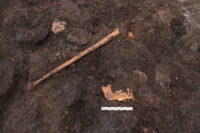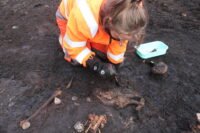 Skeletal remains from what archaeologists believe is an ancient sacrificial victim have been discovered in Egedal on the island of Zealand, Denmark. The bones were found in an archaeological survey of a site slated for development around Town Hall. The found a femur and jaw bone first, and then unearthed legs, pelvis and more of the jaw. The bones belong to a single individual, and while an initial osteological examination found no direct evidence of sacrifice on the skeletal remains, the discovery of a Neolithic flint axe and a concentration of animal bones and pottery next to the body strongly suggests a ceremonial offering context from the Danish Neolithic (3900-1700 B.C.).
Skeletal remains from what archaeologists believe is an ancient sacrificial victim have been discovered in Egedal on the island of Zealand, Denmark. The bones were found in an archaeological survey of a site slated for development around Town Hall. The found a femur and jaw bone first, and then unearthed legs, pelvis and more of the jaw. The bones belong to a single individual, and while an initial osteological examination found no direct evidence of sacrifice on the skeletal remains, the discovery of a Neolithic flint axe and a concentration of animal bones and pottery next to the body strongly suggests a ceremonial offering context from the Danish Neolithic (3900-1700 B.C.).
“That’s the early phase of the Danish Neolithic,” said excavation leader Emil Struve(opens in new tab), an archaeologist and curator at the ROMU museums in Roskilde. “We know that traditions of human sacrifices date back that far — we have other examples of it.” [..]
Struve said the flint ax-head found near the body was not polished after it was made and may have never been used, and so it seems likely that this, too, was a deliberate offering.
The style of the axe dates it to around 3600 B.C.
The area around ancient Egedal was a well-travelled transport corridor through the Værebro river valley dotted with settlements. The find site was a marshy area and the bog that evolved from it was still actively mined for peat well into the 20th century. Bog bodies are known for the preservation of soft tissue and  organic materials that can take place in the anaerobic environment of peat bogs, but only the bones of this individual have been preserved.
organic materials that can take place in the anaerobic environment of peat bogs, but only the bones of this individual have been preserved.
The remains are now being cleaned and studied. Researchers will radiocarbon date the bones to narrow down when the person died. They also hope to be able to approximate their age by the wear on the teeth and their sex by the shape of the pelvis. More questions may be answered if ancient DNA can be extracted from the teeth.